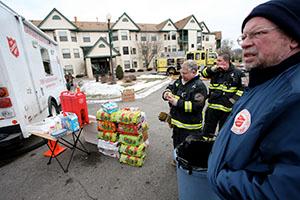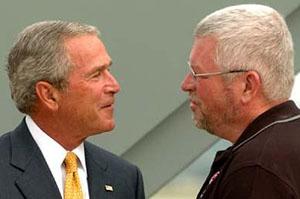Volunteer recalls serving at high-profile disasters
If you think being a Salvation Army disaster volunteer doesn’t sound exciting, you haven’t met Jim Daly. In 15 years of volunteering, Daly has served at some of the most high-profile disasters in American history.
That includes 9/11. He spent two weeks in a Salvation Army tent near the morgue at Ground Zero, supervising a 10-person team of volunteers serving food and drinks to relief workers.
 “There were 18 refrigerated semis full of body parts right down from us,” recalled Daly, a retired Lieutenant with the Ramsey County Sheriff’s Department. “I spent a lot of time talking to the cops and firefighters there; I had a connection to them. A lot of them had survivor’s guilt. They wondered why their buddy got killed but not them.”
“There were 18 refrigerated semis full of body parts right down from us,” recalled Daly, a retired Lieutenant with the Ramsey County Sheriff’s Department. “I spent a lot of time talking to the cops and firefighters there; I had a connection to them. A lot of them had survivor’s guilt. They wondered why their buddy got killed but not them.”
In Minnesota, Daly led The Salvation Army’s responses to the 35W bridge collapse of 2007 and North Minneapolis tornado of 2011. At the bridge site, he helped serve more than 10,000 meals to Navy divers, engineers and cleanup crews.
 Daly has also been deployed to several Salvation Army flood relief operations in Fargo, North Dakota. And in November 2013, he was the incident commander for The Salvation Army’s response to a devastating tornado in Washington, Illinois that leveled hundreds of homes (pictured).
Daly has also been deployed to several Salvation Army flood relief operations in Fargo, North Dakota. And in November 2013, he was the incident commander for The Salvation Army’s response to a devastating tornado in Washington, Illinois that leveled hundreds of homes (pictured).
“They were match sticks – complete devastation,” Daly said. “I was there for two whole weeks. In that time we served over 30,000 meals.”
Every person counts
Daly and fellow disaster volunteers know that serving at large-scale disasters is no more important than serving at smaller ones. What matters is that disaster survivors and first responders receive unwavering support.
 To that end, Daly’s main job as a disaster volunteer involves being on call to provide hot meals, snacks and drinks at house fires, police calls, and other local emergencies within the Twin Cities. He often gets deployed in the middle of the night.
To that end, Daly’s main job as a disaster volunteer involves being on call to provide hot meals, snacks and drinks at house fires, police calls, and other local emergencies within the Twin Cities. He often gets deployed in the middle of the night.
Daly knows from experience how important it is to support first responders.
“In the late 90s, I remember being on a SWAT team call in a trailer park at 2 a.m., and somebody from The Salvation Army showed up with hot coffee and sandwiches,” Daly recalled. “He was out there in the rain for three hours. I appreciated that. I thought, ‘I could do that when I retire.’”
As a retired patrol supervisor once in charge of 60 law enforcement personnel, Daly knows many of the police officers he serves.
“This is a continuation of what I did as a police officer – helping people,” he said.
In addition to The Salvation Army, Daly volunteers for several other organizations, including performing fossil digs for the North Dakota Geological Survey and U.S. Forest Service.
“My two most unique finds were the skull of a saber-tooth cat and a 30-million-year-old baby turtle,” Daly said. “I’ve always been interested in fossils. I minored in geology.”
Presidential nod
Daly has never sought recognition for his service to The Salvation Army. Yet on Aug. 21, 2007, he couldn’t have received more notoriety.
 That day, President George W. Bush gave Daly the President’s Volunteer Service Award for his work at the 35W bridge collapse. The pair met on the tarmac at the Minneapolis-St. Paul International Airport.
That day, President George W. Bush gave Daly the President’s Volunteer Service Award for his work at the 35W bridge collapse. The pair met on the tarmac at the Minneapolis-St. Paul International Airport.
“I watched the president walk off of Air Force One, then we talked for four or five minutes,” Daly said. “He was very calm and put me at ease. He was also very complimentary of The Salvation Army. I don’t remember a lot of our conversation because I was in awe of the situation. Just seeing Air Force One pull up was a moving experience.”
Get involved
The Salvation Army needs trained disaster volunteers across Minnesota and North Dakota. Typical volunteer duties include providing food, drinks, hygiene kits, first-aid supplies, clean-up kits and more to survivors and first responders.
Additional volunteers are needed to counsel, listen to and pray with survivors through our Emotional and Spiritual Care program.
Additional specialty volunteers are needed to perform things like bookkeeping, logistics, information technology, and more.
“Being a disaster volunteer is extremely rewarding,” longtime volunteer Frank Powers said in this heartfelt blog. “All it takes is a little of your free time.”
Learn more about becoming a disaster volunteer, including upcoming training sessions in Minnesota and North Dakota.
